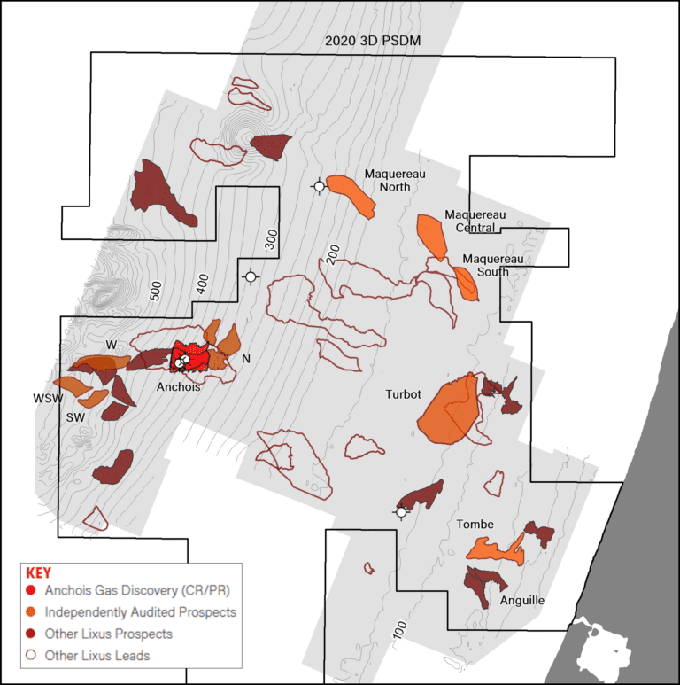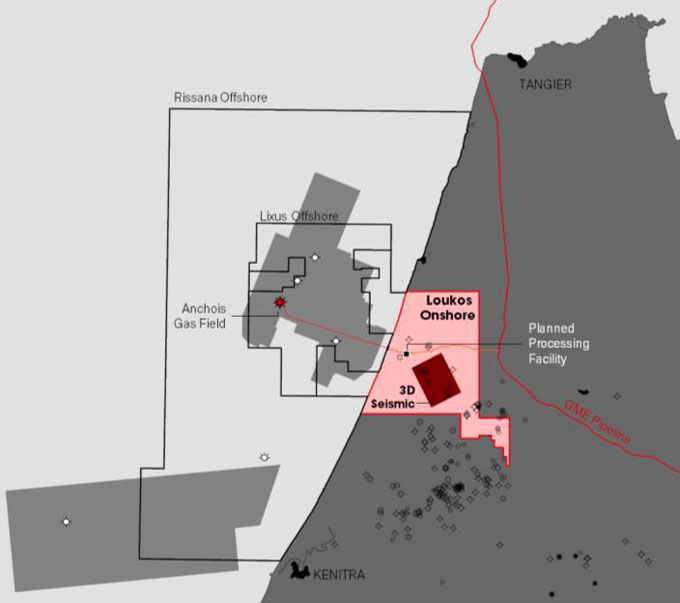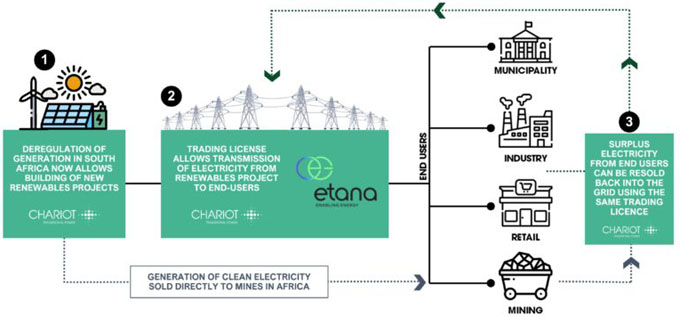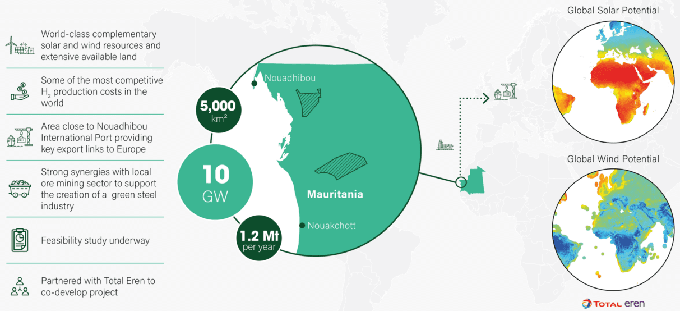Chariot is an Africa focused transitional energy group with three business streams, Transitional Gas, Transitional Power and Green Hydrogen.
Chariot Transitional Gas is focused on a high value, low risk gas development project offshore Morocco in a fast-growing emerging economy with a clear route to early monetisation, delivery of free cashflow and material exploration upside.
Chariot Transitional Power is focused on providing competitive, sustainable and reliable energy and water solutions across the continent through building, generating and trading renewable power.
Chariot Green Hydrogen is partnering with Total Eren and the Government of Mauritania on the potential development of a 10GW green hydrogen project, named Project Nour.
Transitional Gas
Moroccan offshore gas development project with the potential to positively impact a growing economy, heavily reliant on energy imports and coal.
Morocco - The Anchois Gas Development Project
The Lixus Offshore licence covers an area of approximately 1,794km², with water depths ranging from the coastline to 850m. The area has extensive data coverage with legacy 3D seismic data covering approximately 1,425km² and 5 exploration wells, including the Anchois-1 and Anchois-2 discovery wells.

The Anchois gas discovery represents a high value gas appraisal and development project.
- Anchois-1 gas discovery – previously audited total remaining recoverable resource in excess of 1 Tcf, comprising 361 Bcf 2C contingent resources and 690 2U prospective resources.
- The appraisal and exploration well, Anchois-2, drilled safely, on time, and on budget, discovered excellent quality, dry gas across seven reservoirs with approx. 150m net pay.
- Updated Independent Assessments made in 2022 provide material increase in resources for the Anchois Gas Field, which now stand at 637 Bcf 2C contingent resources and 754 Bcf 2U prospective resources.
- High quality reservoir properties that mean producer wells can produce gas at high rates, reducing the associated drilling and completion costs and subsea complexity.
- Excellent gas quality, without impurities such as carbon dioxide or hydrogen sulphide, means that standard materials and technology can be used for the flowline and processing facility
- World-class commercial contract terms with high gas prices in a developing market with growing energy demand offers a potentially high-value project
- Project financing for the development of the project to be led by notable investment bank Societe Generale
- Reservoirs are directly imaged on seismic data, with distinctive seismic signatures, showing bright, high amplitudes and far-offset (AVO) seismic anomalies, increasing the confidence in the lateral extent of the sands away from the discovery well location and other systems on-block
- Material low risk exploration satellites with significant tie-back potential
- Additional on-block exploration upside of >4.5 Tcf
Lixus Portfolio
In addition to the Anchois Discovery, the Lixus portfolio is estimated to contain around 3 Tcf of audited gross contingent and prospective gas resources. Further upside has been identified since the most recent audit, estimated to contribute an additional >1.5 Tcf to the portfolio.
Rissana offshore
The Rissana Offshore licence, covering an area of 8,489km², surrounds the offshore boundaries of Chariot’s existing Lixus Offshore Licence, as well as covering the most prospective northern areas of the previously held Mohammedia Offshore and Kenitra Offshore licences.
- Chariot operates the block with 75% interest.
- Material potential running room in various plays
- Initial minimum licence commitment is the acquisition of a 2D seismic survey, over a portion of the acreage, which will help to evaluate the extension and potential of these plays across Rissana.
Loukos Onshore
The Loukos Onshore licence, covering an area of 1,371km², is adjacent to Chariot’s Lixus and Rissana offshore licences; it is also the location of the planned Anchois processing facility and pipelines.
Chariot operates the block with 75% interest and is performing a detailed evaluation on existing modern 3D seismic data of 150 km² and previously drilled on-block wells. Work has led to the identification of an overlooked, shallow, conventional gas play, which:
- has already produced gas in other areas onshore Morocco,
- is geologically similar to Chariot’s offshore projects including the Anchois gas discovery
- contains multiple low risk gas prospects, supported by characteristic seismic attributes
- is de-risked by gas and reservoir proven in previously drilled, offset wells, which targeted deeper alternative plays

Loukos has the potential to deliver early gas sales due to the proximity to a significant and undersupplied industrial gas market.
Primary energy demand in Morocco has doubled since the year 2000 and is forecast to double again from 2015 to 2030. In terms of power generation, imported fossil fuels dominate, with Morocco relying on imports for over 90% of its primary energy needs. The Moroccan government has been working on policies designed to improve security of supply, to provide industries access to cleaner energy at a low cost, and to minimise the environmental impact of its energy mix. As part of this process, gas has been a major factor in its vision, including the construction of further power infrastructure.
Domestic Gas to Market
- Chariot’s acreage sits in a prime position to meet domestic needs, with 67% of Morocco’s GDP originating from the Atlantic coastal areas
- Gas from Chariot’s activities are deliverable to the power, industrial and export markets via a variety of potential solutions, including piped gas, leveraging off of the existing GME pipeline and existing supply pipelines in the Kenitra area, or via ‘virtual pipeline’ solutions using compressed or liquified natural gas (CNG or LNG).
- Chariot’s position to supply gas to the domestic market has been strengthened through Gas Sales Principles with the state national utility ONEE, pipeline tie-in agreements with owners, and project partners ONHYM, and a partnership with Vivo Energy, a leading distributor of petroleum products in Morocco.
- Beyond Morocco, export gas sales opportunities are also being discussed with multiple offtakers, for the delivery of surplus gas to Europe, where the desire for a diversity in gas supply has increased.
- Competing with imported petroleum products such as LPG, which is believed to have recently risen in response to the reduced supplies, Chariot has access to an attractive and scalable domestic market, which will also benefit the Kingdom through the delivery of cleaner and cheaper energy to help deliver the associated economic benefits to all stakeholders
Transitional Power
Working in partnership with Total Eren with a right to invest between up to 49% into the co-developed projects, Chariot have a fast-growing pipeline of projects approaching 1 GW
IAMGOLD
Inaugurated in 2018, the 15 MW Essakane solar PV project in Burkina Faso is one of the largest hybrid solar-thermal plants in the world; a project which won the 2019 TSM Excellence Award a year later.
Tharisa
The 40 MWp solar PV project will supply electricity to the South African PGM mine on a minimum 15-year PPA on ‘take-or-pay’ basis, contributing to the company’s goals to become carbon neutral in 2050.
First Quantum Minerals
This 430 MW project at FQM’s copper-gold mine is one of the most ambitious renewable energy projects in Africa, complementing and expanding Zambia’s existing renewable energy capacity, utilising both solar and wind resources.
Karo
Solar power will be provided to the newly constructed PGM mine in Zimbabwe at the initial installed capacity of 30 MW, part of a broader project of 300 MW to be developed over the mine’s evolution.
Etana Electricity Trading Licence
Chariot's trading platform, Etana, will provide the opportunity to enhance and revolutionise the energy mix across South Africa by supplying greener power for commercial and industrial requirements.
Chariot has broadened both its exposure and approach to the renewable energy sector within South Africa, in acquiring an interest in Etana which holds an electricity trading licence and which is already testing the platform.
Etana’s objective is to deliver unique renewable energy mix solutions at competitive prices to help address the significant power requirements across South Africa with the licence opening up access to a range of high-volume off-takers including municipal, industrial and retail customers.

Renewable Water Business
Chariot’s water business is focused on providing clean water solutions using renewable energy.
Utilising a modular, scalable reverse osmosis technology that can be powered 100% by solar energy to produce desalinated water, a proof-of-concept project at the largest wind farm in Djibouti has now been commissioned.
This project will provide 50m3 potable water per day to local communities for the next 20 years and the team is looking to build out this offering into further jurisdictions on the continent.
Green Hydrogen
Project Nour
Chariot’s green hydrogen project, “Project Nour”, spans two onshore areas totalling approx. 5,000km², across northern Mauritania; a location that takes advantage of the wide scale wind and solar potential, important for large-scale renewable energy generation and low-cost hydrogen production.
Project Nour also benefits from geographical proximity to Nouadhibou (Mauritania’s deep-sea port) and to large European markets, with the potential to make Mauritania one of the world’s main producers and exporters of green hydrogen.
Chariot is working in partnership with the Government of Mauritania to support their ambition to become a leading producer and exporter of green hydrogen, the latter strengthened through the MoU signed with the Port of Rotterdam in April 2022, which was a first step in establishing supply chains to enable the sale of green hydrogen and its derivative products (notably ammonia) into Europe.
With up to 10GW of installed electrolysis to produce green hydrogen and green ammonia, Project Nour could become one of the largest global projects of its kind by 2030. The Project has the ability to create a range of positive impacts through socio-economic development in Mauritania through increased investment, job creation, skill development and increased government revenues.
Its world class potential was verified by the Pre-Feasibility Study (“PFS”), as announced in May 2022. Chariot is partnering with Total Eren to co-develop this project.

Collaboration on Green Hydrogen Pilot Projects in Morocco
In August 2023, Chariot Green Hydrogen Limited, a subsidiary of Chariot Limited, Mohammed VI Polytechnic University (UM6P) and Oort Energy Limited (Oort), signed further Partnership Agreements to extend their collaboration to test the production of green hydrogen in Morocco. The agreements are focused on the construction, commissioning and operating of an electrolyser pilot project as well as further development of skills and training within the sector.
The pilot 'proof of concept’ project will utilise a 1MW polymer electrolyte membrane (“PEM”) electrolyser system, patented by Oort and it is intended that this project will be hosted at UM6P’s Research and Development facility in OCP Jorf Lasfar, Morocco, the largest fertilizer complex in the world.
The partnership will concurrently develop education and capacity building at UM6P to support the growth of a green hydrogen economy alongside evaluating the feasibility of the implementation of largescale green hydrogen and ammonia production, consistent with the timetable initially envisaged.
Green Hydrogen Market
Green hydrogen is predicted to play a vital role in the global energy transition.
Of the ~115 Mt of global H2 production, green H2 currently makes up 2-4%.
Estimates for global H2 demand for 2050 suggest up to 800 Mpta of demand may come from green hydrogen alone, potentially 100% of hydrogen demand.
Project Nour has the ability to generate 1.2 Mpta of green H2 per year, demonstrating the enormous growth potential of the hydrogen industry and the requirement for large projects like Nour.
Leadership
Adonis Pouroulis, Chief Executive Officer
George Canjar, Non-Executive Chairman
Julian Maurice-Williams, Chief Financial Officer
Duncan Wallace, Technical Director
Pierre Raillard, Head of Gas Business & Morocco Country DirectorBenoit Garrivier, Transitional Power CEO
Laurent Coche, Green Hydrogen CEO
David Brecknock, Gas Projects and Drilling Manager
Nick Shepherd, General Counsel
UK Representative Office:
Chariot Ltd
19-21 Old Bond Street, London, W1S 4PX, United Kingdom
Tel: +44 (0) 207 318 0450
Company Profile: Chariot LimitedKeyFacts Energy: Chariot Oil & Gas Morocco country profile
 KEYFACT Energy
KEYFACT Energy